Author: Xiaoyan
Editor: Caiyun
Source: New Fire
Around 5:00 p.m. on December 16, 2023, SenseTime announced a obituary, "Our beloved founder, artificial intelligence scientist, director of the Pudong Laboratory, director of the Shanghai Artificial Intelligence Laboratory, and professor at the Chinese University of Hong Kong, Tang Xiaou, passed away due to ineffective treatment on December 15, 2023, at 11:45 p.m."
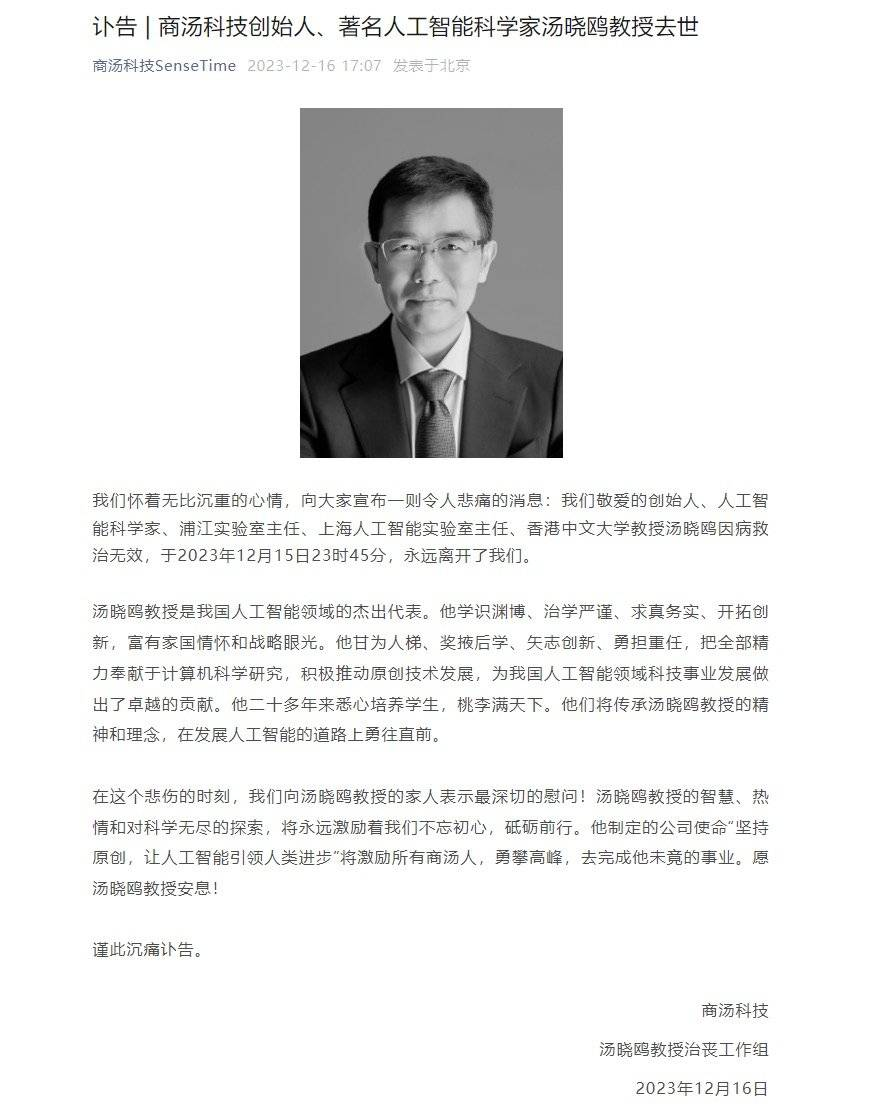
The name Tang Xiaou may not be familiar to many people, but for the AI field in China, Tang Xiaou is of great importance. He is hailed as a giant in the field of AI and the father of facial recognition.
Tang Xiaou was not just a simple technical intellectual, nor a mere entrepreneur. He used academia to lead business, bringing about a revolutionary technological era. His passing is like a hero falling suddenly without any warning, leaving people lamenting.
For the entire AI community, this is a devastating blow.
Why is Tang Xiaou's premature death considered a loss of a rare talent?
It is understood that Tang Xiaou, the founder and chairman of SenseTime, passed away in his sleep on December 15 at the age of 55. His untimely death is reminiscent of the jealousy of the heavens, as Tang Xiaou's achievements in the field of AI are of great significance.
Tang Xiaou was born in Anshan, Liaoning in 1968. He graduated from the University of Science and Technology of China in 1990, obtained a master's degree from the University of Rochester in the United States in 1991, and a doctorate from the Massachusetts Institute of Technology in 1996.
After that, Tang Xiaou joined the Chinese University of Hong Kong and founded the Multimedia Laboratory. It is worth mentioning that in addition to his academic work, he also served as a member of the 14th National Committee of the Chinese People's Political Consultative Conference, as well as the director of the Pudong Laboratory, director of the Shanghai Artificial Intelligence Laboratory, professor at the Chinese University of Hong Kong, researcher at the Shenzhen Advanced Institute of the University of Chinese Academy of Sciences, and doctoral supervisor.
Tang Xiaou's main research focus was in the field of computer vision, including multimedia, computer vision, pattern recognition, and video processing, and he is considered a "pioneer" and "trailblazer" in global facial recognition technology.
In 2014, Tang Xiaou co-founded the strongest AI company in China, SenseTime, with others. The founding team of SenseTime mostly originated from the Multimedia Laboratory of the Chinese University of Hong Kong, which Tang Xiaou established in 2001, including Professor Tang Xiaou and the core members of the laboratory. As of now, the core team members of SenseTime mainly consist of two parts: one part consists of PhDs and master's degree holders from the Massachusetts Institute of Technology, the Chinese University of Hong Kong, Tsinghua University, Peking University, etc.; the other part consists of practitioners from companies such as Microsoft, Google, Lenovo, and Baidu in related fields.
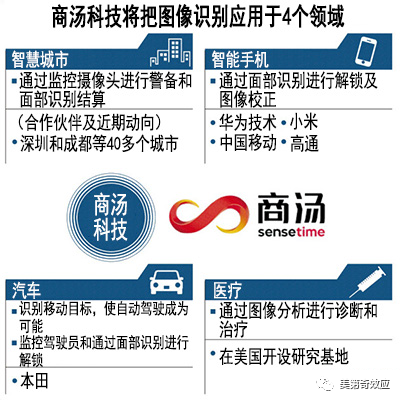
After years of honing and elite talent, SenseTime has become one of the most influential AI companies in China, possessing solid and profound scientific and technological research capabilities as well as rich commercial application capabilities. It can be considered one of the most competitive AI companies in China. SenseTime, CloudWalk, Megvii, and Yitu are collectively known as the "Four Little Dragons" of AI, and this is naturally inseparable from the outstanding efforts of Tang Xiaou and his team. Therefore, we can understand why Tang Xiaou's sudden passing is a huge loss for SenseTime, and even for the entire AI field in China.
Doubts and speculations followed: Was Tang Xiaou's death accidental or a conspiracy?
In this world, besides gossip, conspiracy theories are what people love to talk about the most. For things that happen suddenly and catch people off guard, it is common for people to associate them with a "conspiracy theory."
Tang Xiaou's passing is no exception. Because his death was so sudden, many people are speculating whether there is a hidden story behind it.
It's not surprising that people are inclined to think in the direction of conspiracy theories. Looking back over the past two years, we can't help but feel that there have been quite a few sudden deaths and "bizarre deaths."
On July 1, Feng Yanghe, a famous young scientist in the field of AI and command and control in China, worked overtime until the early hours of the morning and unfortunately died in a car accident while riding a network-operated vehicle home, at the age of only 38. He was an expert in multiple key projects, deputy editor of multiple international journals, chief designer of multiple major subsystems in the military, and was also selected for the first batch of the Zuoqing cultivation plan at the National University of Defense Technology.
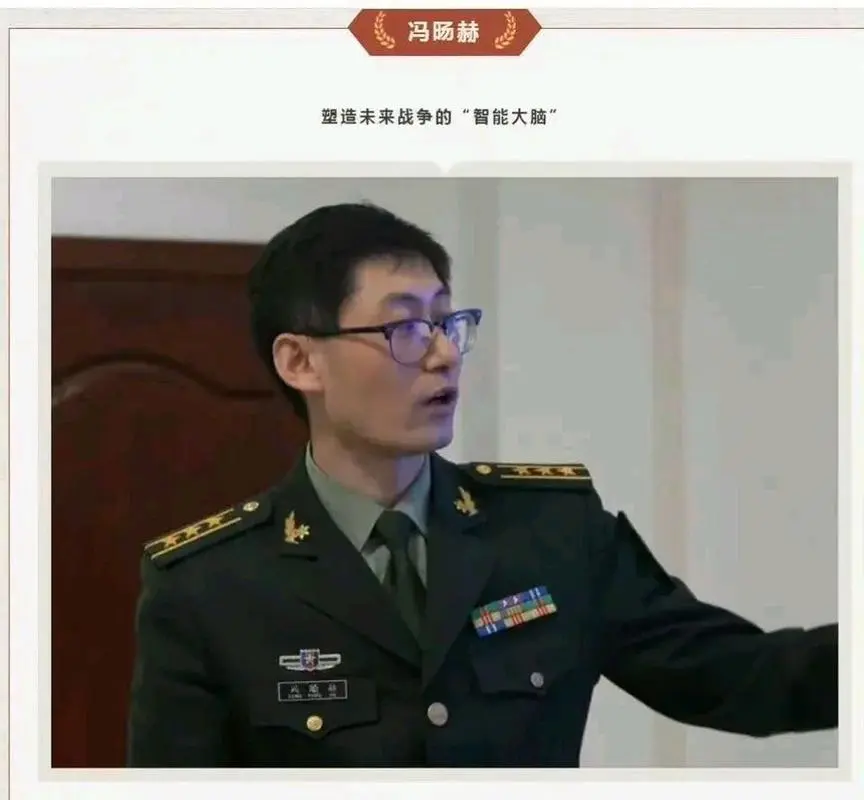
Similarly, in June of the same year, Zhang Dabing, vice dean of the School of Life Science and Technology at Shanghai Jiao Tong University, a Yangtze River Scholar, doctoral supervisor, and a top scientist in the field of transgenic technology in China, who made significant contributions to the management of transgenic biosafety in agriculture and agricultural product trade, unfortunately passed away in a traffic accident.
Going back further in time, on December 1, 2018, Zhang Shousheng, a lifelong professor at Stanford University and a direct disciple of Yang Zhenning, suddenly and unexpectedly jumped to his death just before returning to China.
It is worth mentioning that the investigation results given by the United States for Zhang Shousheng's accidental death were "suicide due to depression." However, to this day, many people still feel that this reason is quite far-fetched. Friends who knew Zhang Shousheng revealed that he could not have had depression, nor was it a suicide. His death was likely related to his research field.
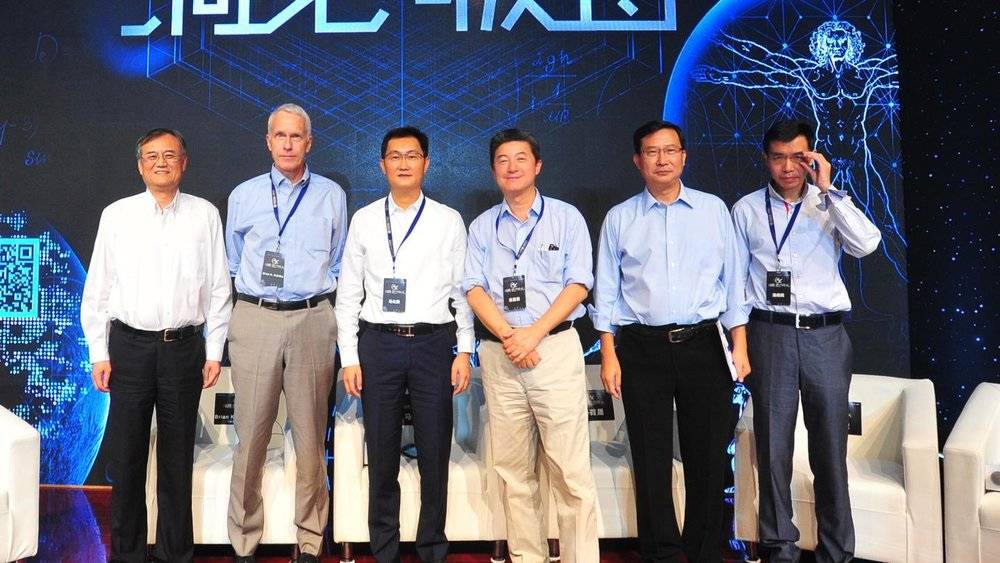
(Professors Zhang Shousheng and Tang Xiaou in the picture have both left us, and their departure is lamentable.)
On December 1, 2018, it was the day he and Meng Wanzhou had agreed to attend a dinner in Argentina together. As a result, on this day, Zhang Shousheng "died by suicide," while Meng Wanzhou was arrested during a layover in Canada.
It is reported that in the first half of 2018, Zhang Shousheng submitted his resignation to Stanford University, but it was rejected (this "rejection" is puzzling because Zhang was a lifelong professor at Stanford University). There are speculations in the public that perhaps Zhang Shousheng's choice to help Huawei research 5G led to his "tragic end."
With so many coincidental and bizarre cases, it is not surprising that some people suspect that Tang Xiaou's sudden passing was a "conspiracy."
Whether it is a conspiracy or not, the premature death of a hero is ultimately "a pain for loved ones and a joy for enemies."
However, considering the information currently disclosed, there are no doubts about Tang Xiaou's passing, and it should be considered a natural death. But one thing is beyond doubt: his premature death is inseparable from the intense competition in the current AI industry and the competition and sanctions between China and the United States.
Before its IPO, SenseTime went through 12 rounds of financing, with major investors including SoftBank, Chunhua Capital, Silver Lake Capital, IDG, Shanghai International Group, Sequoia Capital, and DHVC. Without exception, each of these investors signed a betting agreement with SenseTime. Although SenseTime eventually completed its listing on the Hong Kong Stock Exchange in 2021, its stock price has been continuously declining since its debut, from the highest point of 9.7 yuan to the current 1.26 yuan, losing nearly 90% of its market value.
The reason for this is the same as the common problem faced by most AI development companies: high research and development costs leading to huge expenses and poor profitability. It can be imagined that faced with huge losses, investors will continue to exert pressure. In May 2022, the second largest shareholder of SenseTime, SoftBank Group of Japan, began to reduce its holdings. In less than a year, SoftBank Group reduced its stake in SenseTime from 18.02% to 15.99% three times. In addition, Alibaba has also carried out multiple cash-out operations, reducing its stake in SenseTime from the initial 9.05% to 5.91% through four rounds of reduction.
In addition to internal troubles, SenseTime also had to face external threats. The U.S. professional short-selling firm Grizzly Research targeted SenseTime. Grizzly Research published a short report stating that SenseTime artificially inflated its revenue through related-party transactions. Grizzly's doubts about SenseTime mainly focus on three points.
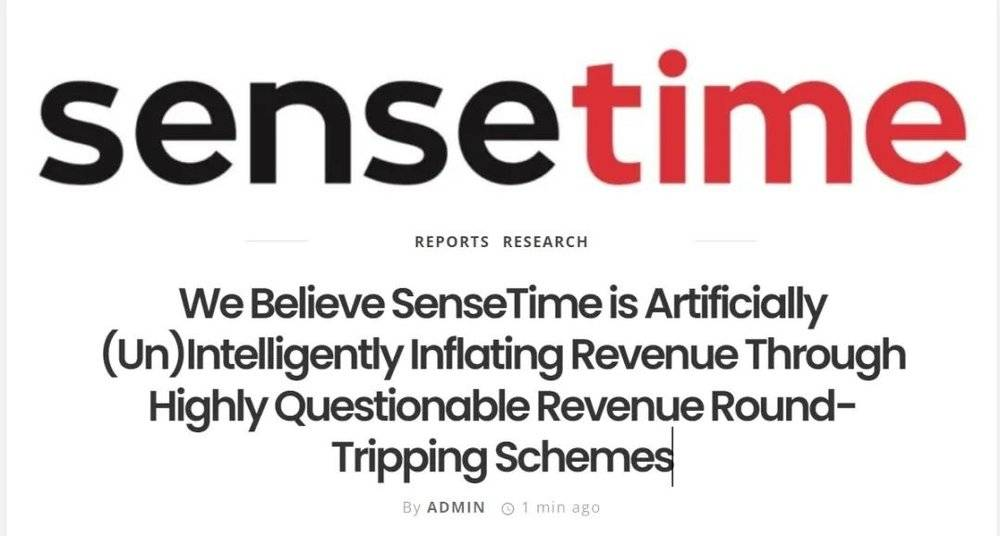
First, SenseTime deliberately concealed related parties and engaged in financial manipulation through related-party transactions—artificially inflating revenue, but this still cannot improve the company's current cash flow shortage, which continues to incur losses of tens of millions of RMB each year. Second, one of SenseTime's core businesses, facial recognition, is not profitable. The competition from peers is extremely fierce, and it cannot obtain large government orders. Third, Grizzly believes that "smart money is starting to cash out and leave" at SenseTime. Tang Xiaou and his holding company, Amind, sold 1.87 billion shares of SenseTime on June 30. Major institutional shareholders such as SoftBank and Alibaba are also gradually reducing their holdings.
Grizzly is a U.S. short-selling firm specializing in targeting Chinese companies. Prior to SenseTime, Grizzly had repeatedly targeted Chinese concept stocks, including NIO, Gaotu, and Pinduoduo, all of which suffered greatly. So, this time, it is a typical case of "long-planned and well-prepared."
With pressure from investors internally and malicious short-selling from foreign institutions externally, we can't imagine the amount of pressure Tang Xiaou, caught in the middle, had to bear, and how these pressures may have impacted his sudden passing.
With the passing of the individual, so many questions remain unanswered. Tang Xiaou has left SenseTime and Chinese AI with an uncertain future.
免责声明:本文章仅代表作者个人观点,不代表本平台的立场和观点。本文章仅供信息分享,不构成对任何人的任何投资建议。用户与作者之间的任何争议,与本平台无关。如网页中刊载的文章或图片涉及侵权,请提供相关的权利证明和身份证明发送邮件到support@aicoin.com,本平台相关工作人员将会进行核查。




